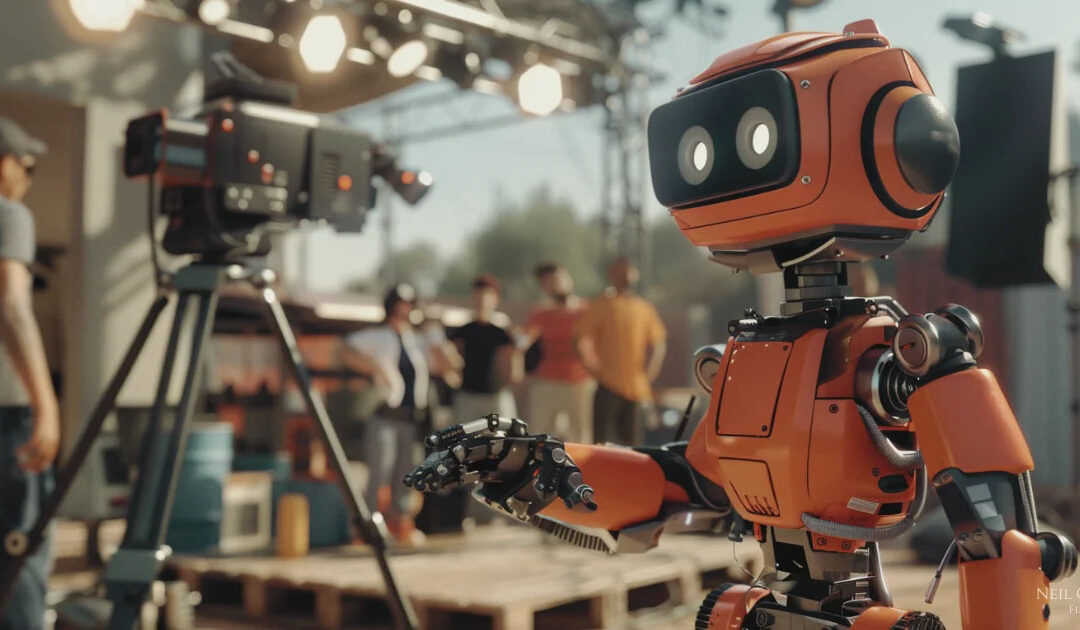AI in film 2025 is transforming Hollywood in ways that few could have predicted. From AI-written screenplays to deepfake actors and enhanced special effects, artificial intelligence is reshaping both the creative process and the business of cinema. While some celebrate the efficiency and innovation AI brings, others fear it could replace human storytellers and threaten the very soul of filmmaking. This debate on technology and creativity reflects the broader cultural implications of AI vs Human Creativity, sparking conversations among artists, critics, and audiences alike.
How AI Is Already Reshaping Hollywood
Transitioning into today’s industry, AI isn’t just a futuristic concept—it’s already here. Screenwriting software powered by AI can generate storylines, dialogue, and even entire scripts in minutes. Meanwhile, studios use AI tools for casting analysis, predicting which actors will bring in the biggest box office returns.
-
Case Study: In 2023, a short film written largely by GPT-based software was accepted into a European film festival, igniting fierce debate about originality.
-
Deepfake Technology: Actors’ likenesses can now be replicated digitally, raising both ethical and legal questions.
For creators, this shift represents opportunity and risk in equal measure.
The Legal and Ethical Challenges
Moreover, AI’s rapid adoption in film raises serious concerns. Deepfake actors, for instance, could replace performers without their consent. Screenwriters argue that AI-written dialogue lacks the emotional nuance of human experience.
-
The Writers Guild of America strike in 2023 highlighted these issues, with many writers demanding protections against AI replacing their work.
-
Copyright law remains murky: if AI generates a script, who owns it—the programmer, the director, or the AI itself?
This uncertainty reflects a larger problem across industries, echoing the debate on AI vs Human Creativity at large.
Opportunities for Filmmakers
Despite concerns, AI is not just a threat—it’s also a tool. Independent filmmakers can now access affordable AI-driven editing tools, special effects generators, and virtual set builders. This democratization of filmmaking means more voices and stories can reach audiences without the massive budgets of Hollywood blockbusters.
Practical Tools to Explore:
-
AI Script Generators – Draft ideas quickly, then refine with your human touch.
-
AI Editing Software – Tools like Runway ML or Descript speed up post-production.
-
Virtual Actors – Useful for experimental art or pre-visualization, though ethically complex.
👉 Check out our guide on the cultural implications of AI vs Human Creativity to see how these changes fit into the bigger picture.
Broader Cultural Implications
Finally, AI in film connects to a cultural crossroads. Are audiences ready to watch AI-generated movies without human actors or directors? Or will there always be demand for authentic human storytelling?
Interestingly, surveys suggest younger audiences are more open to AI-driven content, while older generations remain skeptical. This divide could shape the future of Hollywood as studios chase trends and adapt business models.
Must-Have Tools for Creators 🎥
If you’re a filmmaker, podcaster, or digital creator, AI can actually enhance your workflow:
-
🎤 Microphones for Filmmakers – Capture high-quality dialogue for live shoots.
-
💻 Digital Audio Workstations (DAWs) – Edit and mix soundtracks seamlessly.
-
🎬 Sample Packs & Sound Effects – Add atmosphere to AI-assisted or indie productions.
AI in film 2025 presents a paradox: it offers unparalleled opportunities while raising difficult questions about originality, ownership, and authenticity. Hollywood is only beginning to grapple with these challenges, and the decisions made today will shape the industry for decades.
👉 What do you think—would you watch a fully AI-created film, or do you believe human creativity is irreplaceable? Share your thoughts in the comments, and don’t miss our pillar article on the AI vs Human Creativity debate for a deeper dive.

Charlie Perkins is a Rochester, MN, author, musician, photographer, and videographer. The Chicago-bred Perkins attended Northwestern University, concentrating on Radio, TV Broadcasting, and Interpersonal Communications. He spent 29 years at Harris Bank in Chicago and taught “Principles of Corporate Television” at Columbia College in the same city. He has also spent 17 years as Unit Manager of Media Support Services for the Mayo Clinic. In a previous life, he covered the Chicago Bulls and Michael Jordan’s championship run, ’96-‘98 as a freelance photographer.


Recent Comments